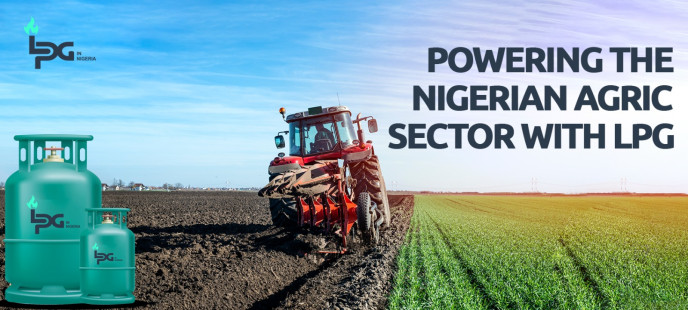- 4504
- 0
Sharing Ideas and Updates on LPG in Nigeria and related information to enable effective collaboration within the LPG Value Chain
Powering The Nigerian Agric Sector With LPG

Agriculture, a cornerstone of global sustenance, is evolving to meet the challenges of the 21st century. As we navigate the intricate balance between food production and environmental impact, the energy landscape on farms plays a pivotal role. From human and animal energy to renewables, diesel, petrol, and electricity, farms rely on diverse energy sources. This blog explores the current energy dynamics on farms, the associated challenges, and the transformative role of LPG in revolutionizing sustainable agriculture.
The Energy Mix on Farms:
Farms employ various forms of energy, reflecting the diversity of agricultural operations. Human or animal energy works the land, while renewable energy, diesel, petrol, LPG, and electricity power machinery and support operations such as heating, drying, and pumping. The choice of energy and its intensity depends on the farm type and level of mechanization.
Global Energy Consumption in Agriculture:
A snapshot of global energy consumption in agriculture reveals that 3-5% of total final energy is used directly in the sector in OECD countries. In the EU, open-field agriculture accounts for 3.7% of total annual energy consumption, and the food production and supply chain contribute to approximately 30% of total global energy consumption.
Challenges and Solutions:
With a growing global population and the need to increase food production by 50% by 2050, agriculture faces unique challenges. Energy use on farms differs from industrial or domestic use, presenting challenges such as off-grid locations, mobility requirements, peak energy use, and the need for reliability. Addressing these challenges necessitates innovative solutions, including energy efficiency and precision agriculture.
The Role of LPG:
LPG emerges as a key player in addressing the challenges faced by modern agriculture. Already playing a crucial role on millions of farms globally, LPG offers a myriad of applications, including irrigation pumps, crop drying, storage or livestock rearing heating, greenhouse heating, flame weeding, machinery and equipment, agricultural building heat, CO2 generation, flame sanitation, pest control, forklifts, generators, grain dryers, and water heating.
Advantages of Using LPG in Agriculture:
1. Fewer Chemicals: Applications like flame weeding reduce the need for chemicals, making it compatible with organic farming.
2. Cost-Effectiveness: In many regions, LPG provides a cost-effective energy solution for diverse applications.
3. Secure Supply: LPG ensures a reliable energy source, critical for the welfare of livestock and crop viability.
4. Versatility: One fuel, multiple applications, showcasing the flexibility of LPG in addressing diverse energy needs on farms.
5. Storage: LPG can be stored on-site, offering energy availability when required.
6. Portability: Transportable in cylinders or mounted on farm equipment, LPG provides mobility for energy-intensive applications.
7. Lower Emissions: Compared to liquid or solid fuels, LPG aids in reducing particulate and greenhouse gas emissions.
8. Soil Protection: LPG eliminates the risk of ground pollution, contributing to sustainable farming practices.
9. Efficiency: With the ability to store a significant amount of energy, LPG ensures readiness for farm operations.
Going Renewable with LPG:
As the volume of renewable LPG increases, the potential for farmers to adopt renewable energy sources grows. Waste and residues from farms, along with cover crops, can expand the renewable feedstock base for LPG, completing the carbon cycle and further reducing the carbon footprint of agriculture.
In the dynamic landscape of modern agriculture, LPG emerges as a sustainable and versatile energy solution. Its adoption on farms worldwide signifies a transformative shift towards energy efficiency, reduced environmental impact, and increased resilience in the face of evolving agricultural challenges. As the agricultural sector embraces LPG, it paves the way for a greener and more sustainable future in food production.
















0 Comment.